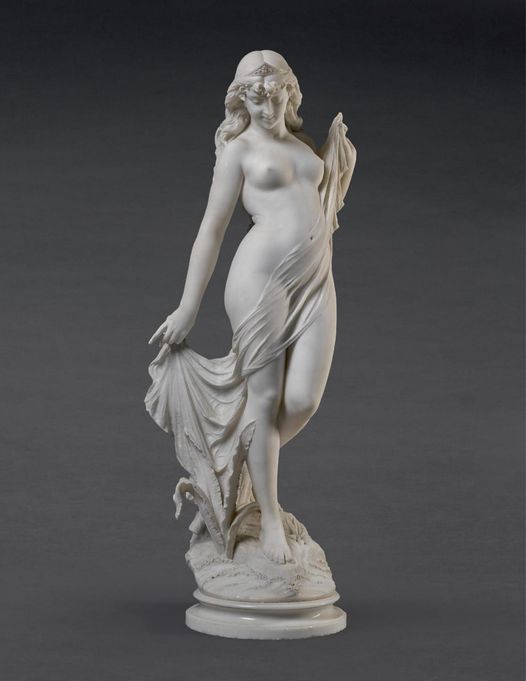Ferdinando Andreini, an illustrious Italian sculptor active in the late 19th and early 20th centuries, remains celebrated for his intricate and expressive marble works. Among his notable creations is “La Bagnante” (The Bather), a stunning sculpture that epitomizes the grace and beauty characteristic of Andreini’s artistic style. This piece, sculpted from pristine white marble and set upon a revolving serpentine column, demonstrates the artist’s mastery over form and his ability to imbue static stone with dynamic life.

Artistic Background of Ferdinando Andreini
Born in 1843, Ferdinando Andreini was part of the vibrant Italian sculptural scene that flourished in the wake of the Renaissance tradition. Working primarily in marble, Andreini developed a style that melded classical influences with the emerging sensibilities of the modern era. His sculptures often featured figures from mythology and nature, rendered with a level of detail that emphasized both the physical beauty and the inner emotions of his subjects.
Description of “La Bagnante”
“La Bagnante” stands at 125 cm in height, including its socle, with the supporting column measuring an additional 90.5 cm. The sculpture portrays a young woman emerging from her bath, captured in the act of gracefully lifting the drapery that envelops her form. The figure’s pose—her head turned slightly over her shoulder, her expression serene yet introspective—suggests a moment of private reverie, perhaps a quiet contemplation of nature or her own thoughts.
Technical Excellence and Symbolism
Andreini’s work is renowned for its technical precision and emotional depth. In “La Bagnante,” the smooth contours of the figure contrast beautifully with the textured drapery and the naturalistic base, where detailed foliage adds a touch of realism. The choice of white marble enhances the purity and almost ethereal quality of the sculpture, while the revolving column on which it stands allows viewers to appreciate the artwork from all angles, highlighting the three-dimensionality and fluidity of the form.
The Bather’s Place in Art History
“La Bagnante” is more than just a decorative piece; it is a representation of the human connection to the elemental, a theme that has been explored by artists throughout history. Andreini’s interpretation brings a distinctly personal and intimate perspective to this theme, focusing on the individual experience rather than mythological grandeur. This approach makes “La Bagnante” a compelling study in the evolution of sculptural representation, from the idealized forms of ancient sculptures to the more personal and emotionally resonant figures of modern art.
Ferdinando Andreini’s “La Bagnante” is a testament to the enduring appeal of classical themes in sculpture, reinterpreted through the lens of modern sensibilities. This sculpture not only showcases Andreini’s skill as a carver but also highlights his understanding of human psychology and his ability to translate that into marble. For art enthusiasts and historians, “La Bagnante” offers a link to the past while continuing to inspire and captivate with its timeless beauty and sophistication. As such, it remains an important piece within the oeuvre of 19th-century Italian sculpture and a cherished example of how art can bridge the gap between the classical and the contemporary.








